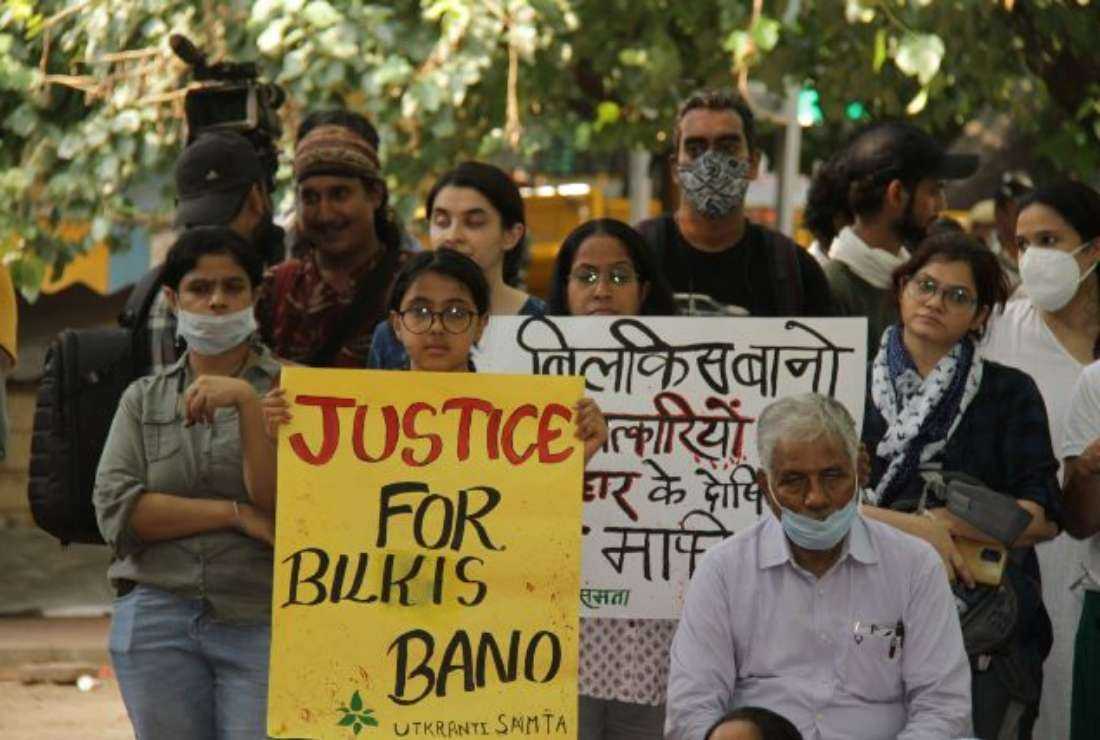Indian minorities criticize release of gang rapists
Christian and Muslim representatives slam government for granting remission to 11 convicted men in the Bilkis Bano case

Indian protesters call on the federal government to reverse a decision by the western Gujarat state to release the gang rapists of a Muslim woman, in New Delhi on Aug. 27. (Photo: Bijay Kumar/ UCA News)
India’s religious minorities including a Catholic priest-activist have expressed dismay over the early release of 11 convicts in the gang rape of a pregnant Muslim woman during the 2002 sectarian violence in Gujarat.
The provincial government of the western state of Gujarat in an affidavit submitted to the Supreme Court on Oct 17 disclosed that it had sought the federal government’s approval before releasing the convicts in the Bilkis Bano case.
The federal government said it had given its “concurrence and approval” for the release of the men convicted of gang rape and the murder of 14 members of Bilkis Bano’s family including her three-year-old daughter.
India’s top court is hearing several petitions challenging the Aug 15 release of the convicts who were serving life sentences. The heroes’ welcome accorded to them after their release caused global outrage.
Gujarat officials then said the remission for the men was approved by a state panel as the men who were convicted in 2008 had spent more than 14 years in jail, besides considering their advancing age and good behavior in jail.
Father Cedric Prakash, a Jesuit priest and rights activist based in Gujarat, said setting the 11 convicted men free on India’s Independence Day “naturally raises major concerns on jurisprudence and on wider ramifications of justice.”
“It is the victims and only they who need to call the shots”
He said that as a Christian one certainly has to accept that people can change and they should be forgiven, but it must be remembered that Bilkis Bano has gone through an unbelievable amount of suffering too.
“It is the victims and only they who need to call the shots as to whether remission is justified or not,” the priest added.
Father Pradesh said it is important to view the Bilkis Bano case in perspective. It was a heinous crime of mass rape and murder that tore at the very heart of accepted moral behavior in civil society.
“The judiciary and society must ensure that such heinous crimes are never repeated. The granting of remission provides a certain amount of legitimacy to the criminals. It is a blatant travesty of justice. Even procedurally, it smacks of one-sidedness. The remission needs to be revoked immediately,” Father Prakash said.
Mohammad Salim Engineer, secretary-general of Jamaat-e-Islami Hind, said that “the justifications for the release of the gang rape convicts show the governments’ attitude toward minority communities, especially Muslims.”
Engineer said since the pro-Hindu Bharatiya Janata Party was in power both in New Delhi and Gujarat, this unfortunate decision will make Muslims fear they’re being further reduced to being “second-class citizens” in this country.
The release of the convicts has caused massive outrage across the country with several opposition parties, activists and journalists, criticizing the decision. More than 6,000 concerned citizens issued a statement urging the Supreme Court to revoke the early release, describing it as a “miscarriage of justice.”
The attack on Bilkis Bano and her family was one of the most horrific incidents reported during the sectarian riots in Gujarat after 60 Hindu pilgrims died in a fire on a train in Godhra town on Feb. 27, 2002.
Bilkis Bano, who was then 19 years old was gang raped by 11 men as she tried to flee with her family and acquaintances from a village near Ahmedabad on March 3, 2002. She survived after losing consciousness and the attackers left, believing she was dead. Two boys — aged seven and four — were the only other survivors of the massacre.
The 2002 Gujarat riots saw extreme events of violence mostly targeting Muslims and left over 1,000 people dead, nearly 225 missing, and 2,500 injured.

